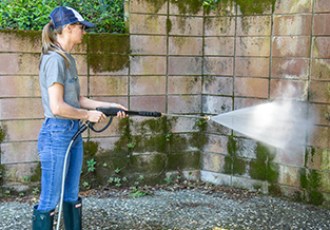BestReviews is reader-supported and may earn an affiliate commission. Details
We recommend these products based on an intensive research process that's designed to cut through the noise and find the top products in this space. Guided by experts, we spend hours looking into the factors that matter, to bring you these selections.

When you’re an avid gardener, you have two mortal enemies: weeds and bugs. Unless you are an organic gardener, a garden sprayer is your best line of defense. Using herbicides and pesticides is an easy, cost-effective way to protect your flowers or vegetables from attack by weeds and bugs, and a chemical sprayer is one of the fastest and most efficient ways to apply them.
At BestReviews, our goal is to give you honest, unbiased insight into the products that you want. We don’t take freebies from manufacturers, so you can be sure you’re getting all of the information you need with no hidden agenda.

Chemical sprayers allow you to treat large areas of your garden all at once, which sure beats pulling weeds by hand. A sprayer is faster and easier to use than a small squeeze bottle. A top-of-the-line chemical sprayer can make your life easier and increase your garden’s output.
Chemical sprayers usually work in one of three ways: powered by a gasoline motor, powered by a battery, or powered by a manual pump.




















A large tank full of herbicide or pesticide is not light, so sprayer manufacturers have devised several ways to move your chemical sprayer. Portability is an important quality in a sprayer, especially if you have a large garden with lots of nooks and crannies.
These are typically much smaller than gasoline- and battery-powered sprayers. Many of them can be controlled with one hand, making them great for flower beds, window boxes, or small gardens. Some very small handheld sprayers don’t even need to be pumped. You simply fill them with liquid and use a trigger to disperse the chemical.
If you plan on treating a large garden, you might want to consider a backpack sprayer. These allow you to easily carry a large tank while keeping your hands free. This style is perfect for large, densely planted gardens. Many backpack sprayers are battery operated, but there are a few that operate with hand pumps.
These chemical sprayers can usually hold a large amount of liquid, but there’s no heavy lifting required when the sprayer rides on wheels. These sprayers are great for people with arthritis or back problems. The drawback is that you can’t easily roll them through densely planted terrain. Wheeled sprayers are most effective on lawns and medium-sized gardens.

It is recommended that you have two different tanks for your chemical sprayer: one for pesticides and one for herbicides. Because you’re dealing with potentially hazardous chemicals, it’s extremely important to keep your sprayer clean and in good working order by following these steps after each use.
Safely drain any chemicals that remain in the tank.
Fill the tank with soapy water.
Spray the water just like you would spray the chemicals. This effectively cleans all parts of the sprayer with the soapy water: tank, hose, and nozzle.

The cost of chemical sprayers ranges from less than $25 to more than $150. The factors that determine the price are tank size, material, and power source.
Inexpensive: For less than $25, you can get a two- or three-gallon pump sprayer with a plastic tank. For $25 to $50, you can get a two- or three-gallon plastic pump sprayer with a few additional items, such as extra or longer hoses. You should also be able to find one-gallon stainless-steel models for this price.
Mid-Range: For $50 to $150, look for backpack pump sprayers and pump sprayers on wheels with four-gallon tanks.

Choose the right tank capacity for your garden. Tank sizes range from one quart to seven gallons.
Adjustable nozzles and interchangeable hoses and wands make spraying easy. This is especially true if you have a large area to cover that includes different types of terrain and vegetation.

Q. Are chemical sprayers safe?
A. Since you are dealing with chemicals, you need to take certain precautions. Wear long pants, a long-sleeved shirt, work gloves, closed-toe shoes, and safety glasses to prevent the chemicals from coming in contact with your skin or getting in your eyes.
Q. What is “spreader sticker”?
A. Spreader sticker is a solution that is mixed into the tank with the herbicide that helps the chemical adhere to the plants. In general, if you use spreader sticker, you can spray less often.
Q. Can I use the same sprayer to apply both herbicides and pesticides?
A. You can if you clean the chemical sprayer thoroughly between uses. However, it is recommended that you have a separate tank for each type of chemical.
Q. Where should I store my chemical sprayer?
A. When it isn’t in use, store your chemical sprayer indoors. If it must be stored outside, cover it with a tarp.
Get emails you’ll love.
Learn about the products you’re wondering if you should buy and get advice on using your latest purchases.
